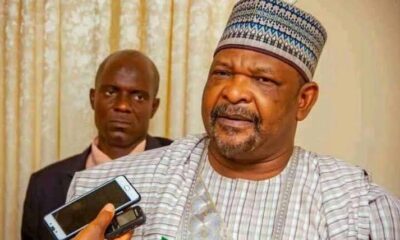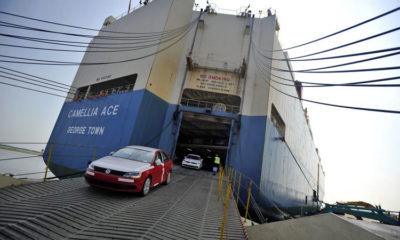- PDP, LCCI React as Buhari Says 2019 Budget Faces Difficulties
President Muhammadu Buhari said on Monday that the 2019 budget would be difficult to implement following the changes introduced to it by the National Assembly.
But the Peoples Democratic Party dismissed the President’s complaint, saying there was no way the National Assembly would return the budget to him the way it was brought to them.
The Lagos Chamber of Commerce and Industry, which noted that there had been complaints over the adjustment of budgets by the legislature over the years, said the judiciary should be allowed to determine whether lawmakers had the power to adjust the budget.
There were indications that Buhari might return the 2019 budget to the ninth National Assembly for a review as the tenure of the current legislature would expire on June 8.
The President signed the N8.92tn budget on Monday but quickly pointed out that the legislature increased his original proposal by N90.33bn from the N8.83tn estimates he laid before it in December 2018.
Speaking at the event, which was witnessed by the Speaker of the House of Representatives, Mr Yakubu Dogara, Buhari said his next line of action was to engage the National Assembly on how best to ensure a smooth implementation of the budget.
He also said his administration and the ninth National Assembly would work more closely to return the country to the January-December budget cycle.
The President said, “You will all recall that in December 2018, I presented our 2019 budget proposal with the theme ‘Budget of continuity.’ Our goal was to use this budget to move the economy further on the path of inclusive, diversified and sustainable growth.
“Back then, I proposed a total expenditure of N8.83tn to the National Assembly for appropriation, targeting strategic and impactful projects and initiatives. However, the 2019 budget I will be signing into law today (Monday) provides for the aggregate expenditure of N8.92tn. This is an increase of N90.33bn over our submission.
“This increase reflects changes introduced by the National Assembly. In some areas, expenses we proposed were reduced while in other areas, they were increased. There were also certain areas where new additions were introduced into the budget. More details of the approved budget will be provided by the Minister of Budget and National Planning.”
Buhari said some of the changes would adversely impact his government’s programmes, making it difficult to achieve the objectives of the Economic Recovery and Growth Plan.
He said, “Although I will be signing this bill, it is my intention to continue to engage the National Assembly to ensure we deliver on our promises. I will, therefore, be engaging with the leadership of the ninth National Assembly, as soon as they emerge, to address some of our concerns with this budget.
“We will also look at how to improve the budget process, so that, amongst other things, we can speed up budget consideration processes and return the country to the January-December fiscal year timetable.”
It should be recalled that Buhari made a similar complaint about the 2018 budget, bordering on “insertions” he said were not in the original executive proposals.
The dispute delayed the implementation of the budget as both the executive and the legislature argued over which of the two arms had the power of appropriation under the 1999 Constitution (as amended).
The disagreement petered out after the President forwarded a series of supplementary proposals to the National Assembly to address the gaps he said the legislature created in the budget.
However, at the signing ceremony for this year’s budget on Monday, Dogara responded to the President’s complaints, insisting that the legislature was not expected to just stamp the executive proposals for presidential assent.
The Speaker argued that merely approving the executive proposals without alterations by the National Assembly would have eroded the relevance of the legislature in a democracy and the principle of checks and balances.
He said, “The issues raised (by the President) relate to certain reductions that were made in the budget and some sub-head increases that were made and that such reductions would make it a bit difficult for some of those projects to be implemented.
“But he said it is an ongoing process and he will have discussions with the leadership of the National Assembly to see what they will be able to do in order to put that behind them and then execute whatever critical projects that suffered some form of hurt in the process of passing the project in the National Assembly.”
Specifically, on the cuts and increases made by the National Assembly, Dogara said, “By the constitution and design, the executive informs us what they intend to do and the representatives of the people in the National Assembly decide what is a priority since they represent the people. It is going to be a knotty area but we will continue to define the relationship between the executive and the legislature.
“Whether it is Britain or the US, wherever it is, there is always a strained relationship on this issue of budget. That is because it deals with high-stake distributional issues as to who gets what, which part of Nigeria gets this and that; so it will continually be an issue.
“We should not be defined by those issues, rather we should define those issues by forming a consensus that is the part to progress and we will continue to do that.”
The Speaker also reacted to Buhari’s desire to return the budget cycle to January-December, as against the current June-May.
He said, “I think that can really be achieved, but it must start with the early and timely submission of the budget to the National Assembly from the executive. A situation where the budget is submitted in December, even if you shut down the entire National Assembly, we will not be able to achieve the January deadline. So going forward, this is a collective exercise between the executive and the legislature.
“In most cases, it is the National Assembly that decides how federally-generated receipts should be expended and the National Assembly took that decision and we are glad that the President has signed it into law.”
The President of the Senate, Bukola Saraki, arrived at the Presidential Villa, just as the signing of the Appropriation Bill ended.
His Special Adviser on Media and Publicity, Mr Yusuf Olaniyonu, told State House correspondents that Saraki was in Port Harcourt, Rivers State, attending another official function when the invitation for the budget event reached his residence on Sunday night in Abuja.
The main opposition party, PDP, said it was not surprised with the claim by the President that it would be difficult for him to implement the budget.
The former ruling party reminded the President that there had been no time from 1999 till date when budgets presented to the National Assembly were returned to the executive the way they were brought to the legislature.
The National Chairman, PDP, Prince Uche Secondus, who spoke with one of our correspondents, said that the way the President had been blaming others for his failure to fix the country, he would soon blame the person in charge of the country between 2015 and 2019 after “he is sworn in on May 29.”
He said, “Go and look at the history of budgets in the country, and even in all the states, legislators always tinker with budgets. It is within their powers to make adjustments where necessary and all that. They were elected to represent constituents, and they have to protect the interests of their people as well.”
The Director-General, LCCI, Mr Muda Yusuf, said it was a good decision by the President to sign the budget since he had spoken about presenting a supplementary budget to the National Assembly.
He said, “It is a good thing that the President has decided to sign the budget so that the implementation can commence because enough time has been lost already.
“Later, this issue needs to be taken to court so that the judiciary can make a pronouncement whether the National Assembly has the power to cut or increase the budget or not. This has been going on every budget year and the court needs to decide what should be done.”

 Forex3 weeks ago
Forex3 weeks ago


 Naira2 weeks ago
Naira2 weeks ago
 Billionaire Watch2 weeks ago
Billionaire Watch2 weeks ago




 Naira2 weeks ago
Naira2 weeks ago




 Naira2 weeks ago
Naira2 weeks ago




 Naira1 week ago
Naira1 week ago




 Naira4 weeks ago
Naira4 weeks ago




 Naira3 weeks ago
Naira3 weeks ago




















